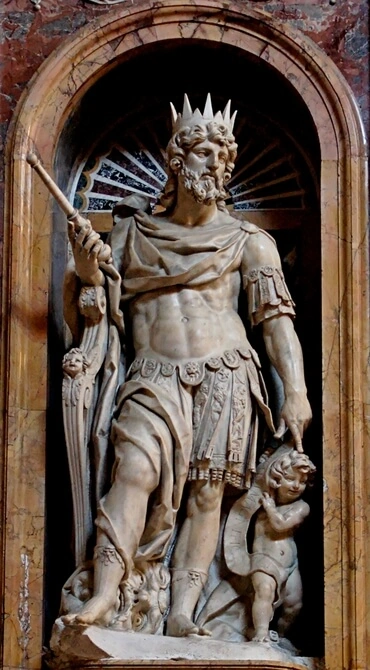2
Och han förde mig fram runt omkring dem, och jag såg att de lågo där i stor myckenhet utöver dalen och jag såg att de voro alldeles förtorkade.
2
Och han förde mig fram runt omkring dem, och jag såg att de lågo där i stor myckenhet utöver dalen och jag såg att de voro alldeles förtorkade.

David is one of the most significant figures in the Bible. He was a musician, one of history’s greatest poets, the boy warrior who killed the giant Goliath, a devout servant of God, a great leader of men and ultimately Israel’s greatest king. His stories cover the second half of the First Book of Samuel and all of the Second Book of Samuel, and his legacy was such that Jesus himself was born in the “City of David” to fulfill prophecies. For all that, David the man was not perfect. Most notoriously, he ordered his soldiers to make sure one of their comrades was killed in battle because he had seen the man’s wife bathing and wanted her as his own. He was also willing to actually ally with the Philistines for a time, while his predecessor Saul was still king. But in spiritual terms, David’s meaning matches his reputation: He represents the Lord, and especially the Lord as we are able to know Him and understand Him. The Writings call this “divine truth,” and it can be our ultimate guide if we want to serve the Lord and make His desires our own. This representation makes sense if we look at following the Lord as a whole picture. There are essentially two elements. First, we need to accept the Lord, believe in Him, open our hearts to Him, worship Him. These are matters of affection, and related to the Lord’s divine goodness. And they are generally represented by priests, who lead worship and perform rituals. Second, we need to act in accord with the Lord’s wishes: We need to serve others, care for those in need, defend the defenseless and work to make life and society better for everyone. These actions require thought, judgment, design, and are thus related to Lord’s divine truth, or divine guidance. They are generally represented by kings, who are men of action and are responsible for the activity of their nations. As the greatest of the kings, David represents this truth in its greatest form.

Ephraim was the second son born to Joseph in Egypt and was, along with his older brother Manasseh, elevated by Jacob to the same status as Joseph’s brothers. Thus when the tribes of Israel are named, Ephraim and Manasseh are named as patriarchs along with their uncles – Reuben, Simeon, Levi, Judah, Dan, Naphtali, Gad, Asher, Issachar, Zebulun and Benjamin -- but Joseph is not. According to Swedenborg, Ephraim represents the intellectual aspect of the church, the part that explores and understands what is true – especially the true ideas that can be drawn from the Bible. Manasseh, meanwhile, represents the affectional aspect of the church, the part that feels and loves and cares. This plays into the best-known story of Ephraim’s life. When Jacob was old and nearing death, Joseph brought his two sons to be blessed. He presented Manasseh to Jacob’s right hand as the elder, and Ephraim to Jacob’s left hand. But Jacob crossed his hands and gave Ephraim the primary blessing. According to Swedenborg, Manasseh was the elder son because ultimately, what we love makes us who we are; our loves form our lives. So our loves are the most central, leading aspect of our human existence, with our intellect playing a secondary role. But as we develop, we need to reverse those. We can use our intellect to understand what is good and right and force ourselves to do it, even when our desires are for what’s selfish. If we stick to that out of a determination to follow the Lord and be good people, the Lord will eventually remove the selfishness from our hearts so we can truly love what is good. By having Jacob bless Ephraim above Manasseh, the Lord is telling us that we have to put our intellect first to pursue our spiritual journey.